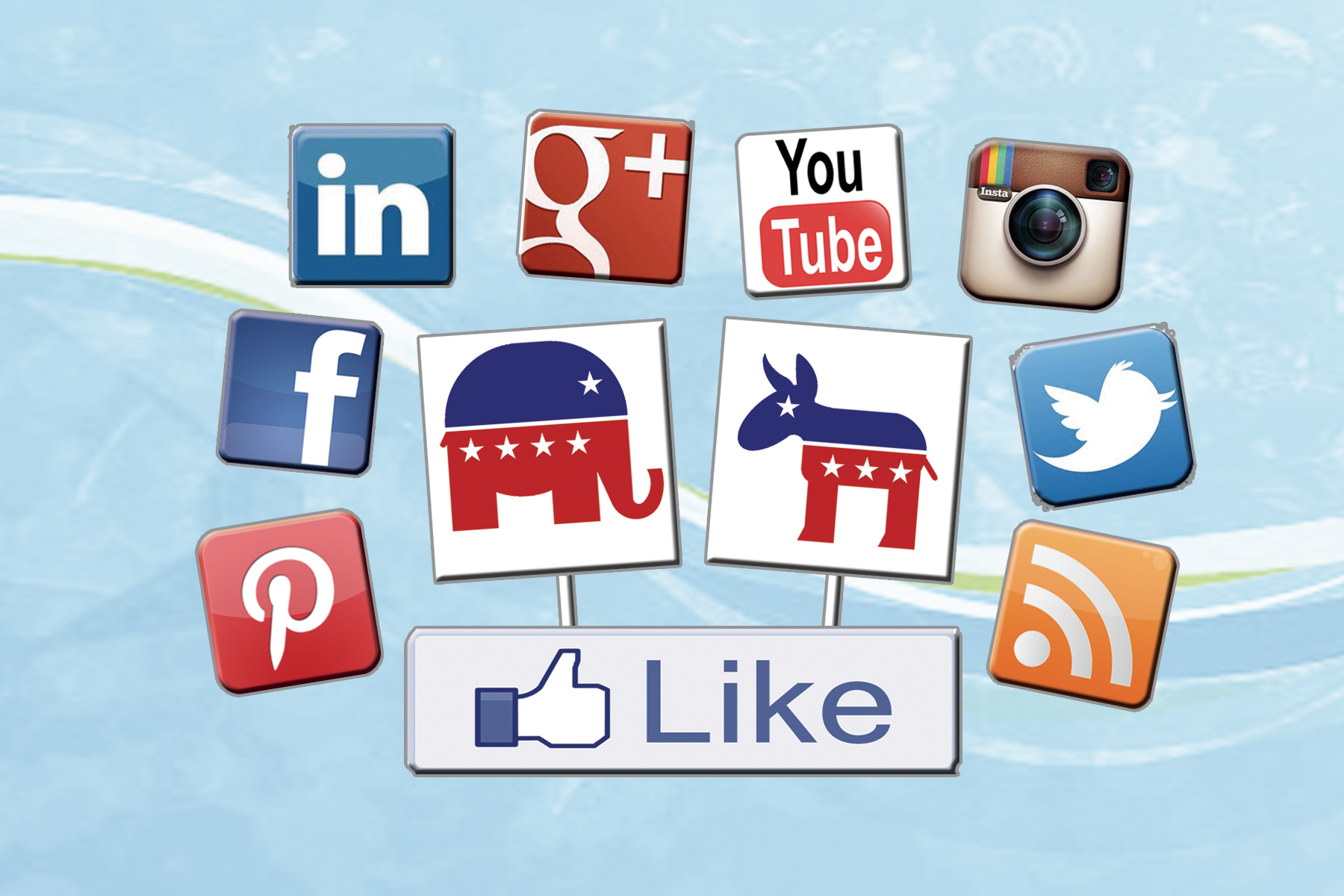On February 10th, a month into her first term in Congress, Rep. Ilhan Omar (D-MN) posted on her public Twitter profile. In months prior, she used Twitter to garner support for her congressional campaign and to share her story as an up-and-coming progressive leader. She later used the platform to celebrate becoming one of the first two Muslim women elected to Congress and the first woman of color to represent Minnesota.
Other young and first-time officeholders are also taking to social media to share their experiences with their followers. Among them is Rep. Alexandria Ocasio-Cortez (D-NY), a freshman Congresswoman and outspoken activist who famously uses her social media to expose the inner workings of Congress, such as how they select their offices and vote on congressional leadership.
Politicians’ use of social media is clearly becoming common practice. Modern technology is breaking long-standing barriers between government officials and their constituents. Through social media networks, politicians can reach their followers directly, with no government formalities or media spin. It adds sincerity and personality to people who hold historically stoic public roles.
Rep. Omar’s casual February 10th Twitter post, however, cost her support from her followers and fellow representatives, and demonstrated how social media can be platforms for both support and division.
In a since-deleted tweet, Rep. Omar indirectly criticized the American Israel Public Affairs Committee (AIPAC), declaring that American support for Israel is “all about the Benjamins.” Twitter exploded, with some arguing against her stance and others accusing her of being anti-Semitic. Omar claimed that her stance was purely political and lacked anti-Semitic undertones or intentions, but the brevity of the tweet makes it impossible to determine her true intent.
Therein lies the problem of using social media for political exchanges. Social media is creating new forms of political interaction, and though it may make politicians and information more accessible, it also makes meaningful political discourse much harder to conduct. Too often, online political commentary leads to controversy simply because of the constraints inherent to social media platforms. Politicians should not use social media to incite discussion through inflammatory rhetoric, nor should the general public formulate hasty and unfounded conclusions on politicians’ casual social media posts.
Two integral characteristics of social media platforms prevent them from being good mediums for political discourse: their reliance on impersonal communication and their restrictions on post length.
Often, controversies borne through online exchanges are caused by simple misunderstandings or are claimed to be misunderstandings by one involved party, as in the case of Rep. Omar or Washington Post columnist Max Boot.
Boot received backlash on a recent tweet, which prompted even his ideological contemporaries to accuse him of promoting racism and genocide. Boot’s tweet linked to his column, in which he argued that removing U.S. troops from Afghanistan and Syria would damage American credibility and perhaps force the U.S. to eventually return to the region under worse conditions. The tweet also included a quote from his piece describing the length of the American Indian Wars and the British deployment in the northeastern regions of Pakistan, which lasted 300 and 100 years respectively.
The racial and imperialist motivations inherent to these wars led people to believe that Boot supported a similar U.S. military campaign in the Middle East. Some accused Boot of promoting genocide, and others extended his analogy to accuse him of inexplicitly promoting forced assimilation, kidnapping, and massacres.
In response to the overwhelming criticism, Boot amended his original post by putting his quote in context. He clarified that he had mentioned those wars not to promote genocide, but rather to the give examples of when guerilla warfare proved lengthy and politically messy. He meant to use the American Indian Wars and the British conflict in Pakistan to warn of the repercussions that could come from asymmetric warfare. Upon reflection, Boot cast the blame on himself for clumsily wording a statement on an incendiary topic. However, he spoke against those in the “Twitter horde,” which he accused of taking his quote out of proportion.
Whether Boot’s rebuttal is genuine or a hasty, face-saving backtrack is uncertain, as tone and nuance translate poorly through text posts. When interacting face-to-face, people can better grasp a person’s intent through body language and tone of voice, and can ask for clarification if a person’s intent is still unclear. With no way to pick up on these non-verbal cues through a text post, social media users make less accurate conclusions on a post’s intended meaning.
These negative effects could be counteracted by well-researched arguments that fully explain a person’s stance and cite supporting evidence. However, social media platforms don’t allow their users to formulate substantive arguments, since most have restrictions on post length.
Though word counts are meant to promote concision, they prevent users from supporting their statements with evidence or fully fleshing out their ideas. This inability to present fully-formed arguments forces users to prioritize punch and shock value over structure and validity. Brevity begins to supersede accuracy and convincing arguments fall to inflammatory rhetoric. This is the true danger of online political discussions: they promote controversial arguments that often lack logical or empirical basis.
They need not be faulted for this, however; limited word counts foster the sort of quick, punchy content for which platforms such as Twitter, Snapchat, and Tumblr are optimized. That these word counts are in place further demonstrates that social media networks were not optimized for political debate, nor should they be used to make inflammatory comments that may require further explanation.
Rep. Omar’s tweet, though casual and brief, incited fury among the public and her Congressional contemporaries. Some claimed that the tweet perpetuated historical stereotypes of Jewish people manipulating the government through closed-door deals. Accusations against her worsened when a tweet from 2012 was discovered in which she stated that “Israel hypnotized the world.” Omar’s tweets exacerbated tensions regarding anti-Semitism, which have run high since the mass shooting at a Pittsburgh synagogue in October 2018. This event inspired reexaminations of each party’s policy lines regarding anti-Semitism, with some accusing American politicians of using anti-Semitism as a political tool. Rep. Omar’s actions even inspired the creation of an anti-hate House resolution, which condemns bigotry and discrimination as a whole.
Rep. Omar responded by stating that her tweet was misinterpreted and blown out of proportion. She explained that her tweet aimed to criticize AIPAC and its lobbying efforts, and that her critique was wrongly extended to Judaism as a whole. Much can be said about the public’s response; many made assumptions and hasty conclusions about Rep. Omar’s opinion that could have been influenced by Omar’s background or faith. However, the fault of this miscommunication could be attributed to Rep. Omar for not stating her case more clearly. For clarity, Rep. Omar should have written a tweet that clearly stated her opinion and intent, especially when commenting on such a sensitive topic.
Politicians should tailor their message to the communication platform they are using. Manifestos should not be published on a platform with a 280-character limit, nor do off-handed quips belong in Senate hearings or other venues of similar importance. Social media platforms are optimized for the mass-sharing of brief posts such as news articles or status updates. Therefore, nothing should be posted on them that may require further clarification or supporting documentation. If an issue requires great detail, political figures can direct followers to op-eds they write, or to articles from reputable sources. By writing op-eds and linking to news sources, politicians would use media platforms as intended and encourage their followers to research important topics.
Those who really wish to engage in meaningful political debate can easily do so through websites built for that purpose. A quick Google search renders multiple viable options, with the most prominent being procon.org.
Procon.org distinguishes itself from other debate sites by providing well-researched arguments on a variety of issues. Users simply select an issue that they would like to explore, and are presented with arguments made by those with expertise in the field—doctors present their position on marijuana usage, scientists state their opinions on animal testing, etc. Procon.org also allows readers to present their own arguments and uses a ranking system to bolster the visibility of well-crafted arguments.
Forums such as the ones on procon.org present users with thoughtful perspectives from multiple sides, preventing the echo chamber effect that regularly occurs on social media. By using these platforms for political debate, people can do justice to the issues they discuss and can strip social media feeds of caustic political clutter.
Social media enables greater participation in political discourse; however, with greater breadth comes lesser depth. Users are not given the capacity to support their arguments or clarify statements that they make, and these restrictions can have significant consequences. These platforms encourage interaction between politicians and the people, but these interactions can easily turn to controversy when platforms aren’t used for their intended purpose. Politicians should leave their arguments for the podium, and internet users should look elsewhere for insightful, research-backed political discussion.
This post is the first in a series that will explore how political institutions, bound to tradition and routine, interact with a new forms of media defined by their transcendence of borders and convention. The World Online will examine how political messaging and media coverage have changed in recent years, and will question whether long-standing political traditions translate well into a global online arena. Social media, political reporting, and the platforms through which most people hear about and interact with politics will feature prominently. The Internet presents to the world a new and seemingly boundless realm of human existence, and with it, a chance to reexamine our institutions and the means through which we interact and coexist.



